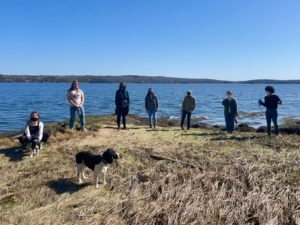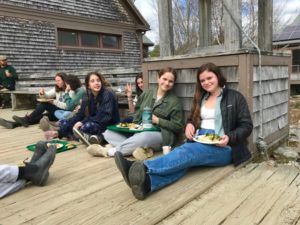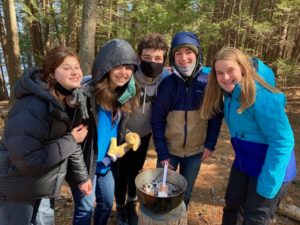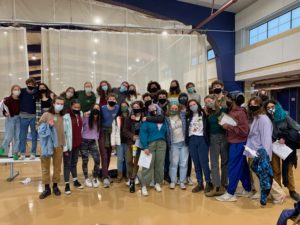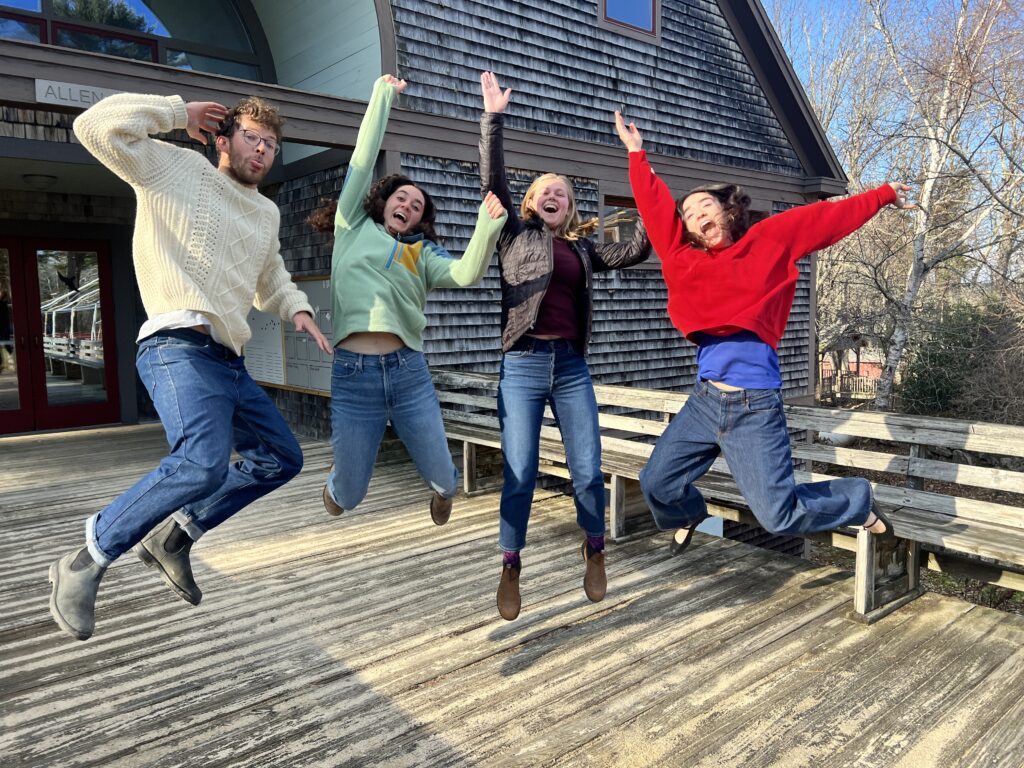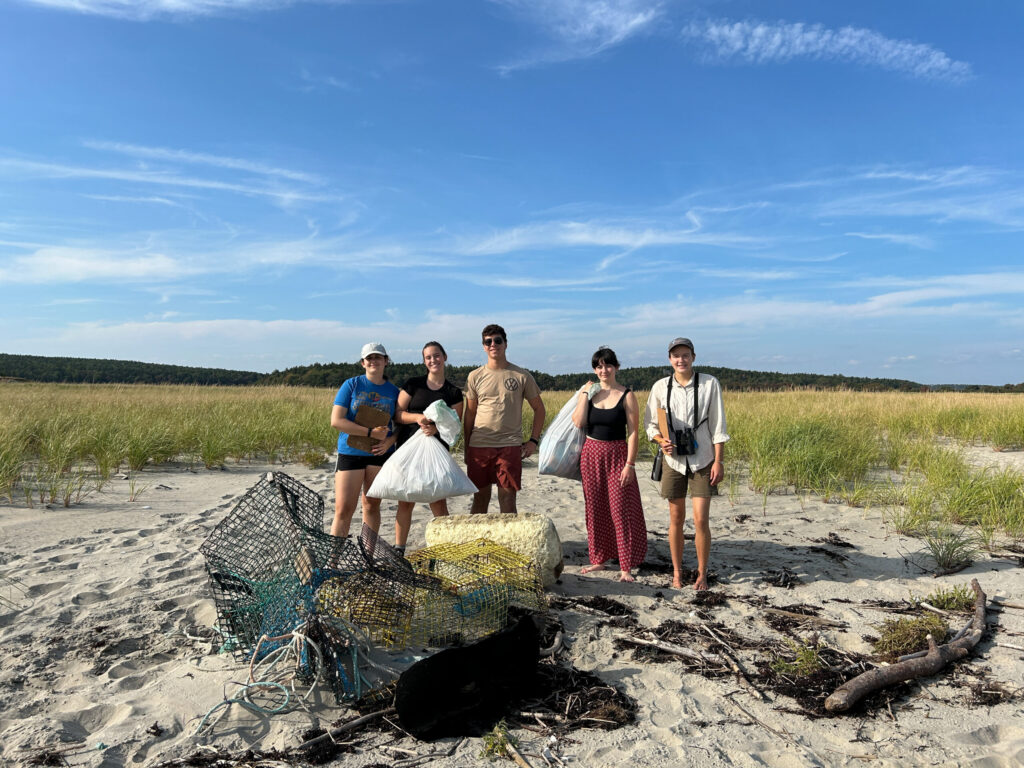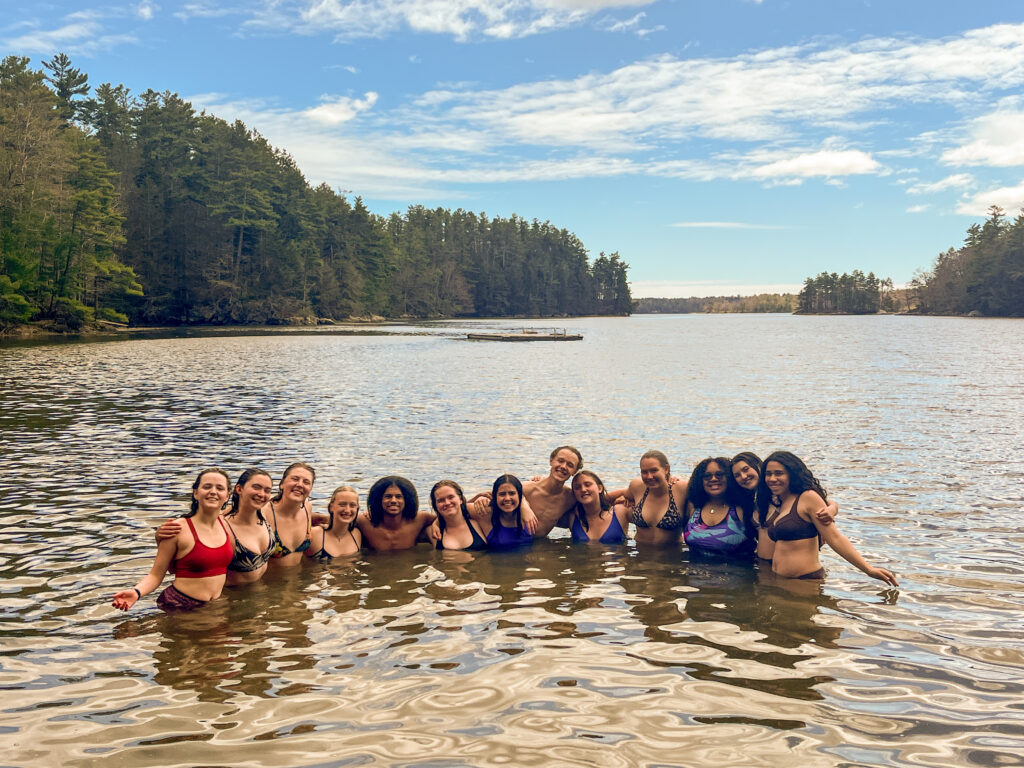For the past three years, Maine Coast Semester at Chewonki has offered a merit-based scholarship to support emerging young leaders from Maine. The Maine Youth Environmental Leaders Scholarship is awarded annually to two outstanding scholars who have demonstrated an appreciation for the natural world and imagine a future creating positive change in their Maine community.
Maine students are an integral part of each Semester cohort, offering valued guidance and support for their out-of-state peers. Given their familiarity with our state’s history, culture, and climate, Maine students tend to be natural leaders here on campus. In turn, Maine students discover a new depth of knowledge about their home state while gaining perspective and skills that will serve them throughout their lives. By offering this scholarship, we hope to inspire more young leaders from Maine to work towards a more sustainable future in our state and beyond.
This year’s scholarship recipients are Elizabeth (Liz) Davis Dunn from Oxford Hills Comprehensive High School and Eleanore (Ella) Allan-Rahill from Orono High School. Both students are attending Maine Coast Semester this spring as part of Semester 66. They were selected for their strong academic achievement, leadership experience, and community involvement.
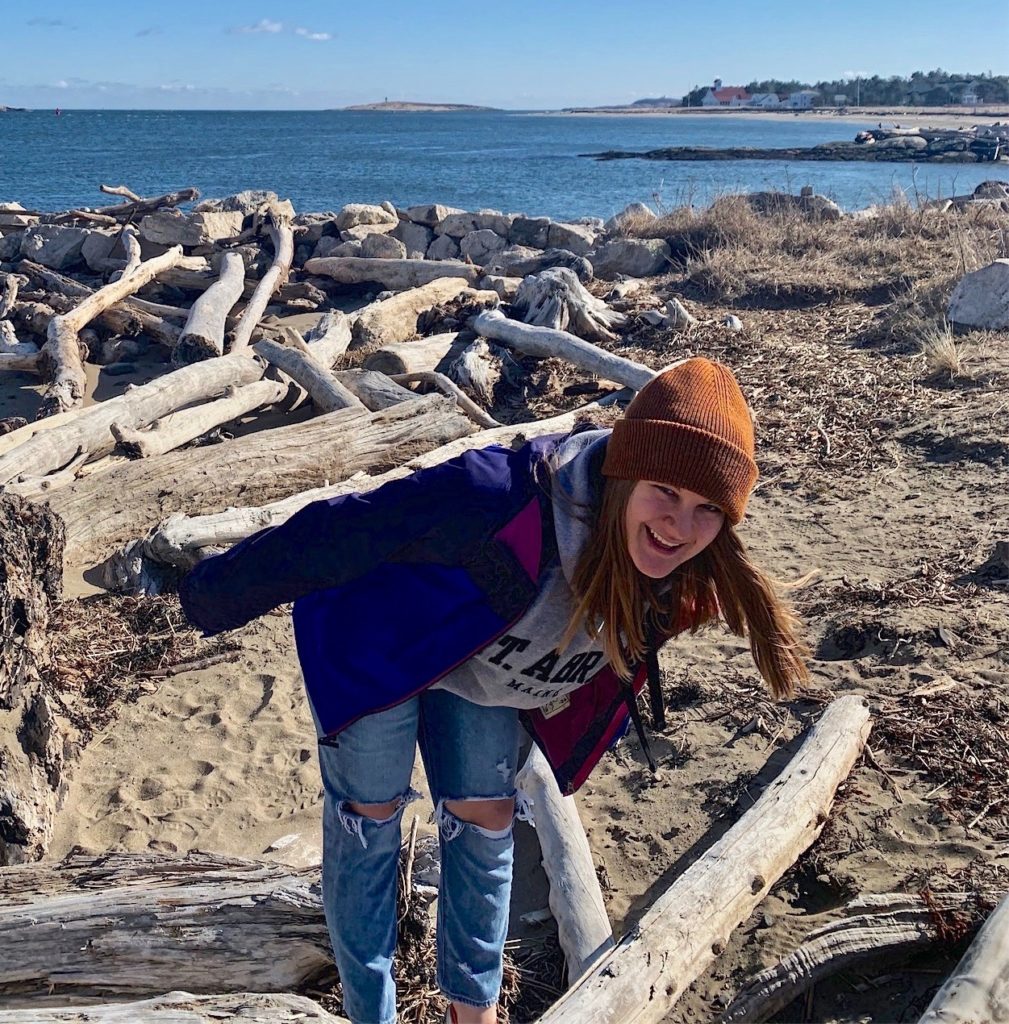
Liz Dunn is a certified Junior Maine Guide (JMG) and Wilderness First Responder (WFR). She has also completed the National Ski Patrol (NSP) 100-hour Outdoor Emergency Care (OEC) course and serves as a Young Adult Patrol at Lost Valley in Auburn. (Read more about Liz’ ski patrol experience in the Spring 2021 issue of LA Metro Magazine.) In the summers, she works as a Counselor for Bryant Pond 4-H Camp. She likes to stay active through skiing, field hockey, and rock climbing. Her love of the outdoors includes a breadth of activities that includes foraging, hiking, swimming, canoeing, kayaking, and snowshoeing. She plans to study Outdoor Education in college, eventually leading trips or teaching ecology to help others connect with the natural world.
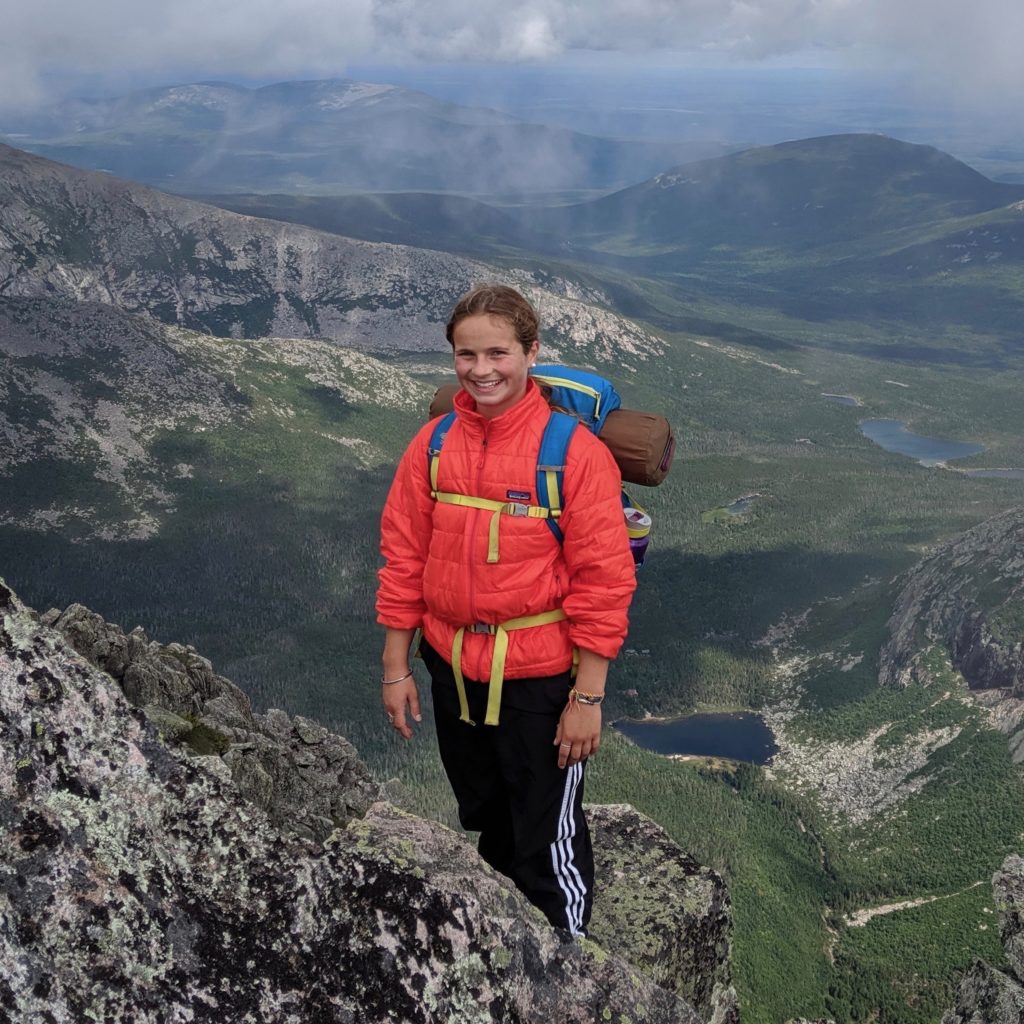
Ella Allan-Rahill serves on the junior board of CISV (Children’s International Summer Village), planning activities for middle school and high school students in the Bangor-Orono area focused on sustainable development, human rights, and conflict resolution. Additionally, Ella serves as Student Council Secretary for her class, and she is the Assistant Captain of her soccer team. She also enjoys ice hockey, tennis, violin, skiing, snowshoeing, hiking, gardening, and dog sitting. She is particularly passionate about science and completed a 3-month research project on climate change and mental health. The fields of study she plans to pursue in college include Marine Biology and Psychology. In her own words, she wants to devote her life to a career that benefits others and the environment.
Read on to hear more about Liz and Ella’s experience at Maine Coast Semester this spring:
Why did you choose to come to Maine Coast Semester?
Liz: I chose to come here because of Katie Curtis (a math teacher at Maine Coast Semester). I met her through a program I did called the Junior Maine Guides program. She told me about Maine Coast Semester, and I thought it sounded really interesting. My home school doesn’t offer a lot of environmental or hands-on learning, and no one else I know has done a semester program before… I thought it would be right up my alley. It sounded like a great way to see a different aspect of education than I had experienced before.
Ella: I was interested because of the information I’d read on the website about being on a farm, being connected to the natural world, and the weekly science field lab (which is one of my favorite parts of the semester). I also chose to come here because of the location, even though I’m already pretty well-acquainted with Maine. Being on the coast is important to me; I’m very interested in marine biology, and I love the ocean and the ecosystems here. That said, I didn’t realize how much I wanted to come until I started getting into the community here… I was generally interested, but it felt so far away. I didn’t have a strong grasp on what the experience would actually be like. Now, as I’ve gotten more immersed in the community, I’ve realized that this was the perfect program for me in this moment.
Is there a place on Chewonki Neck where you feel most at home?
Liz: Probably my cabin, Gillies. It’s like a second home to me. My cabinmates, the people I care about the most, live there. It’s just really nice because it’s a guaranteed safe space where I can be myself.
Ella: It’s hard to pinpoint one spot… It’s taken some time to get to know the campus; there’s lots to explore! Different places feel like home in different ways. My cabin, and the family I’ve built there is really special. Coming home to that space every night really does feel like home, having my friends waiting there for me. Your cabin is a safe space where everyone really supports you. I didn’t realize how close we’d get! It was so awkward at first, but we’ve grown so much and gotten so comfortable with each other. That said, you’ll find pieces of home everywhere. The farm is super welcoming, and I personally really love the Point.
How are the academics at Maine Coast Semester different from academics at your high school?
Liz: The workload is relatively the same as my high school, but it’s definitely more intellectually challenging. Everything I learn here has a purpose, and it’s much more hands-on and outdoors. I’ve noticed that what I learn here “sticks” longer. Also, the teachers here actually care about you and want you to learn. They are very accommodating of your learning needs.
Ella: I come from a public school in relatively rural Maine, and I didn’t think the academics here would be that different, but there are actually lots of noticeable differences. To start, the small class sizes are such a big deal. My AP Calculus class has just 7 students including myself. There are lots of moments when I realize how special the academics are… For example, when we’re sitting outside in the sun doing math problems, or when I look up during science class and there’s a great blue heron. Here, you have an opportunity to interact with what you’re learning about, and the program really fosters a community of curiosity. All of the teachers show genuine interest in your learning, and that has a reciprocal effect where you get even more interested and excited. Having your teachers around is a big deal too; you can talk to them about classes, the news, whenever you want. Also, the material we’re learning is so applicable to everyday life, like the species quizzes for science class. That makes the classes much more welcoming and motivating. I find it a lot harder to stay interested in class material when I’m sitting inside looking at a slideshow and having my teacher just talk though it, versus being here where your teachers want you to learn things that are relevant and important. Being surrounded by a community of learners and curious people is so special.
What has been your most memorable or meaningful experience so far?
Liz: There are two students in Gordy cabin who have been fixing bikes for everyone to use here, and I’ve been helping with that. We just finished a few days ago, and we went on our first bike ride together with the finished bikes! It was so rewarding and memorable. Through that experience of working on the bikes and taking that ride together, we discovered just how much we truly appreciated each other.
Ella: Solos! Just a week ago, I was dropped off at my solo site. I was there for 49 hours; I came back as late as I possibly could. That experience is so different for everyone, and I was a bit nervous leading up to it… I worried about the little things, like: “What do I bring? A watch? A journal? Will I be scared at night if I hear animals? Will I be bored? Did I bring enough stuff to keep me occupied?” Looking back, I “did” very little during solos. I read 5 pages in a book and did some writing. I made art for the first time in a long time. I did virtually nothing, but it was incredible to realize that I’m good company for myself; I’m able to just “be” with myself. I had been building this pressure that solos would be a monumental experience, but I didn’t have any major revelations; I mostly just relaxed. I proved to myself how self-sufficient I am. I can care for myself and I can trust my own abilities. I had lots of small memorable moments too… One time, I sat down to have breakfast in my crazy creek chair and ate my gorp amongst the trees. When I went out to one of the rocks by the water, I was so shocked to see how much the water level had risen! It made me wonder how long I had been sitting there. There were so many little things like that. On Saturday evening, the sun was setting, and I started doing the cotton eye joe dance because I just felt so happy. In general, the solos offer an opportunity to learn about yourself. You don’t get a lot of alone time here at Maine Coast Semester, so the solos are really special. It’s a transformative experience, even if you don’t realize it for a long time afterwards.
How has being a Maine student impacted or influenced your semester?
Liz: Not only am I from Maine, but I’m from really rural Maine. A lot of the other students come from big cities. Learning about other people’s lifestyles relative to my own has really impacted my view of the world. Also, it’s been great to see students from other parts of the country adapting to the weather in Maine. When we were taking our Wilderness First Aid class, one of my friends (who is from Los Angeles) saw snow for the first time! It was really fun to see him have that experience.
Ella: Coming from Maine, I didn’t think this place would be that different, but I realized there is still so much to learn! It’s nice to be acquainted with the environment already. Some students are coming from much further away, like California. For them, coming to Maine is such a shock, adjusting to the freezing cold, seeing snow, learning all the different birds and trees… Sometimes, other students will seek you out with questions as the go-to person about Maine, like: “Will I really need that many layers when we go on encampment?” It’s fun to be the “Mainer,” but not confining in any way. Before coming to Maine Coast Semester, I think I was worried about not going farther away. I was worried about the stigma of studying away in my own state. But there are so many opportunities to learn and grow here, and I think people really appreciate the knowledge that I have about the place. I can be a resource for others. And I’ll be able to carry the knowledge that I have back home and share it there too.
What’s one aspect of Maine Coast Semester that has been surprising or unexpected?
Liz: I’ve been surprised at just how much freedom we have here, and how laid back the atmosphere is. We have a lot of free time during the day, between classes and activities, and it allows you to make connections with people. I thought it was going to be like a traditional school, focused on academics all the time, but it’s a mix throughout the day of academics and social time. People really want to make connections with you and want you to get to know them too.
Ella: Something I’ve been surprised by is how much there is to do all the time. I could never get bored here! There are endless opportunities. It’s also been surprising to see how the community has grown together; it’s such an open and caring group. Similarly, I’ve been surprised by how close my cabin has grown and how much time is spent outdoors. Something else that has been unexpected are the ways we get to give back to the community, and the willingness of other students to take part in that community care and reciprocity, through work program, farm chores, etc. Overall, I’m surprised by how quickly I’ve formed deep connections to the place and to the people here, both students and faculty and staff. From teachers to the kitchen staff to the nurses… It’s amazing how we can all care about each other and forge relationships that serve all of us.
In what ways has Maine Coast Semester helped you learn or grow? Are there any changes you notice in yourself so far?
Liz: I’ve realized how incredibly introverted I am. At home, I always have a lot to do, and I never really stop to think more intentionally about what I’m doing. But here, there’s time to pause and have thoughtful intellectual moments. Many of the classes require a lot of self-reflection as well. So in general, I know more about myself and I’m more purposeful in a lot of the things I do. Being constantly surrounded by other people here has helped me realize how introverted I am, but it’s actually a good thing.
Ella: Before coming here, I was writing goals for myself and asking questions like, “What do I want the semester to look like, and what do I want to get out of it?” I revisited them last weekend during solos, and one of the goals I had written was to be more like “Montessori School Ella” or more like ‘Environmental Club Ella.” For context, I went to a Montessori school when I was younger, and starting in kindergarten, I participated in the Environmental Club – identifying trees, listening to bird calls, etc. My teacher there, Joanne Alex, ran the Environmental Club, and she has been an amazing force in shaping me into the person I am today. Looking back at that goal, I thought about what it actually means: fully immersing myself in the environment, learning as much as I can, and being curious. I think I have achieved that goal to a certain extent! Being here has allowed me to bring positive energy back to my learning; I feel so excited to continue exploring and growing. Sometimes I lose that curiosity in my everyday life when things feel more mundane, or if I’m swayed by other people’s lack of enthusiasm… But being here, I feel I have grown back into that part of my personality. I’m putting myself out there and saying yes to new opportunities like tasting seaweed in science class. I’m growing back into my curious and enthusiastic self. Seeing that transformation, I’m hoping I can hold onto it moving forward.
What advice would you give to other students thinking about applying to the Maine Youth Environmental Leaders Scholarship?
Liz: Definitely just apply for it! If you have a strong connection to the outdoors, care about climate justice, or have an interest in environmental preservation, you can find a lot of like-minded people here. And it can be a big help financially as well.
Ella: Why not? Even if you don’t get it, I think the application process is fun and you can learn more about yourself. It’s a good opportunity to show your knowledge and demonstrate your commitment to the natural world and to your learning. Be as honest as you can; don’t hold back. I think that letting your true self come through in the application will really help. It’s a great opportunity and can help you be here financially. Go for it!

